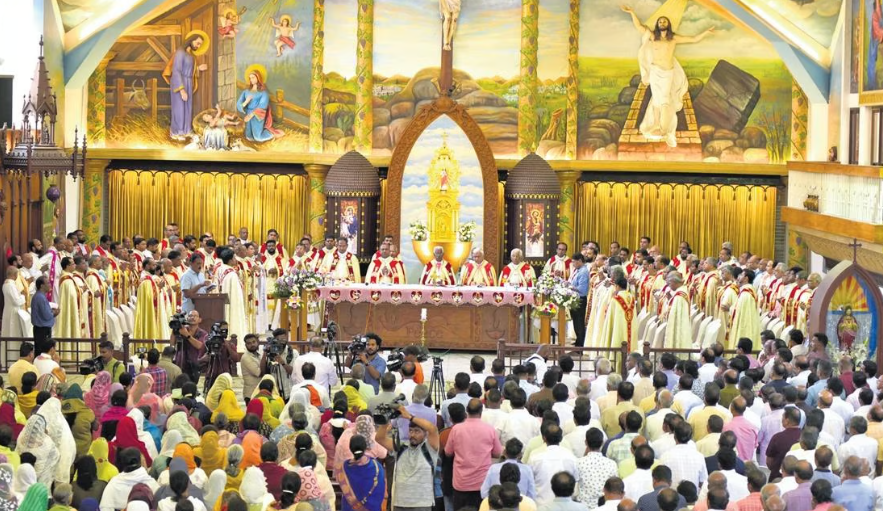Syro-Malabars: Compromise on liturgy tries to overcome divisions
A 'temporary' agreement came into force yesterday on the Feast of St Thomas, which had been indicated as an ultimatum by the Major Archbishop. On Sundays and feast days, at least one liturgy must be celebrated according to the unified rite decided by the Synod. But it will also be allowed to maintain the mode in which the celebrant is facing the people throughout the rite, as requested by the clergy and laity of the archdiocese of Ernakulam-Angamaly
Kochi (AsiaNews) - Just as Major Archbishop Raphael Thattil had issued an ultimatum for July 3, the feast of the Apostle Thomas, the Syro-Malabar Church has finally reached a compromise on the issue of the rejection of the "unified" liturgy that has been dragging on for three years now in the Ernakulam-Angamaly archdiocese.
At the mandate of the Synod, a restricted commission drew up an agreement on 1 July that made it possible to overcome the danger of schism that had been hovering over this very ancient Eastern Catholic Church due to the refusal of one of the 36 dioceses to adhere to the new mode of celebration of the Holy Qurbana, the Eucharistic rite, in which the celebrant must return to addressing the altar and not the faithful at the moment of consecration.
The agreement goes in the direction of communion, repeatedly indicated in his interventions on the matter by Pope Francis.
"The dispute over the liturgy has been temporarily resolved," Fr Kuriakose Mundadan, secretary of the presbyteral council of the Archdiocese of Ernakulam-Angamaly, told AsiaNews.
"The agreement agreed upon by representatives of the priests and laity was discussed at length by a synod group with Archbishop Joseph Plampani, Apostolic Administrator Bosco Puthur, and Curia Bishop Sebastian Vaniapurackal.
The agreement," the prelate explained, "was conditional on the fact that every parish church in the archdiocese, starting on 3 July, would have to celebrate a single Mass in the synodal form every Sunday and on feast days, so that the parishes could continue to celebrate the Holy Qurban Mass addressing the people on all other days. The senior archbishop also agreed that any further changes would be made only after consultation with the canonical bodies of the Archdiocese of Ernakulam-Angamaly'.
The agreement also stipulates that the priestly ordination of the archdiocese's eight deacons, which has remained pending until now, will be carried out as soon as possible. In parishes where there are protests or clashes because of the manner of celebration, the parish priest has the right not to celebrate according to the synodal rite but must inform the archdiocesan apostolic administrator. The same applies to parishes where civil lawsuits are pending on the issue.
"Yesterday, many parishes in the archdiocese celebrated a Eucharistic liturgy in the synodal form," Fr. Mundadan reported, "although in many churches there were fewer participants. The first part of the agreement was therefore respected, now the other points will have to be implemented in the coming days'.
Even the Lay Movement for Transparency - one of the voices most vocal in its opposition to the synodal rite - accepted the terms of the agreement, albeit with a conditional positive opinion on how it would be implemented.
A key decision was not to involve the police and not to use force to implement the order to celebrate according to the unified rite. Canon law could, however, be invoked against priests who openly defy the conciliation measures.
'Considering the developments,' the Lay Movement for Transparency wrote in a note, 'it is hoped that peace will prevail in the archdiocese. Should the synod, however, make any move that violates the conciliation formula, we will withdraw from the agreement'.
24/10/2019 17:56







.png)










